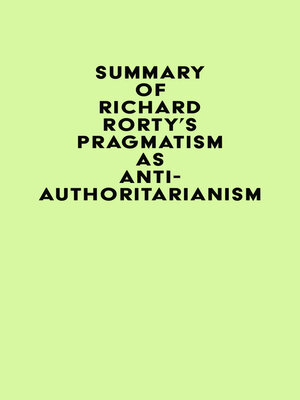
Sign up to save your library
With an OverDrive account, you can save your favorite libraries for at-a-glance information about availability. Find out more about OverDrive accounts.
Find this title in Libby, the library reading app by OverDrive.



Search for a digital library with this title
Title found at these libraries:
| Loading... |
Please note: This is a companion version & not the original book.
#1 The pragmatists' objection to the idea that truth is a matter of correspondence to the intrinsic nature of reality is that it requires us to humble ourselves before something non-human, whether the Will of God or the Intrinsic Nature of Reality. We must set aside any authority save that of a consensus of our fellow humans.
#2 Dewey was a utilitarian, which means he believed that in the end, the only moral or epistemological criteria we have or need is whether performing an action or holding a belief will, in the long run, make for greater human happiness. He saw progress as produced by increasing willingness to experiment and get out from under the past.
#3 Pragmatism is the philosophy of inquiry, and it was developed by Charles Sanders Peirce, George Herbert Mead, and William James. It was anti-foundationalist, coherentist, and holist in its view of the nature of inquiry. It was anti-Cartesian in its view of the universe as evolving.
#4 The three founding pragmatists were Peirce, James, and Dewey. They were all American, and they all had different philosophical concerns. They were all disciples of Kant, but they each improved on his doctrine of categories and his conception of logic.






